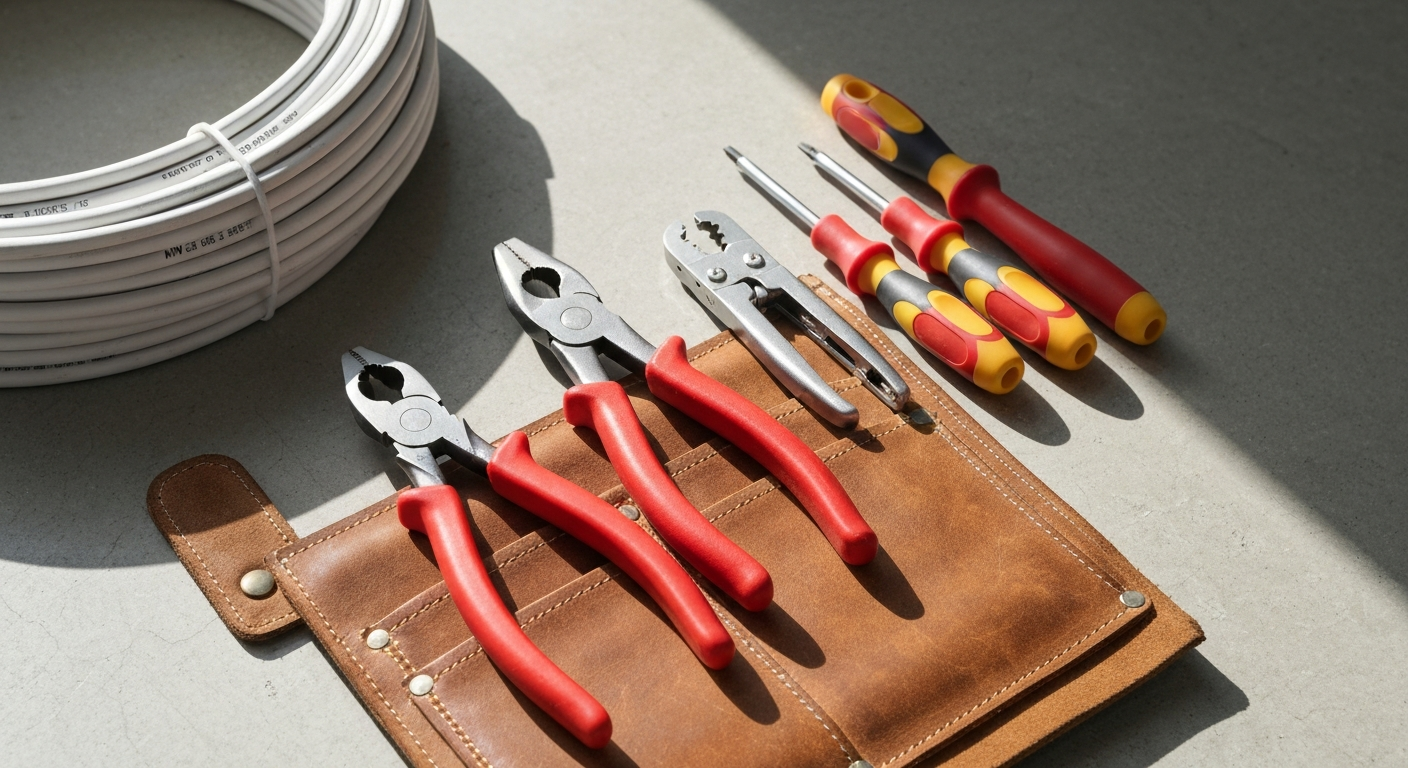
10 Essential Electric Tools Every Apprentice Should Own
This list covers the 10 must-have items you’ll need in your apprentice tool pouch from day one. Investing in quality tools early will not only help you perform your tasks correctly but will also last for years, forming the core of your collection as you progress toward becoming a licensed journeyman.
The Foundational Hand Tools
These are the tools you’ll be reaching for constantly. From cutting and stripping wires to making connections, these hand tools are the bread and butter of electrical work.
1. Lineman’s Pliers
Often called the “hammer” of an electrician, lineman’s pliers are your go-to tool for gripping, twisting, and cutting. They are heavy-duty and perfect for making solid connections with multiple wires before securing them with wire nuts. Look for a 9-inch pair with a high-leverage design and comfortable, insulated grips to protect against shock. These versatile pliers will be a constant companion for tasks involving everything from NM cable (often referred to by the brand name Romex) in residential jobs to heavier gauge conductors.
2. Wire Strippers
Cleanly removing insulation without nicking the copper conductor is a critical skill, and a quality pair of wire strippers makes it possible. A good set will have clearly marked gauges for both solid and stranded wire, a spring-loaded handle to reduce hand fatigue, and hardened cutting edges. As an apprentice, you’ll be stripping hundreds of wires, so a reliable, comfortable tool is a must-have.
3. Insulated Screwdrivers
A set of high-quality insulated screwdrivers is non-negotiable for electrical safety. These tools are designed with non-conductive material covering the shaft, leaving only the tip exposed to protect you from accidental contact with live circuits. Look for VDE-rated tools; this certification from the VDE Testing and Certification Institute ensures the tools meet the IEC 60900 international standard and are tested for protection up to 1,000V AC. Your initial set should include a variety of Phillips, slotted, and square-tip drivers to handle everything from device terminals to panel covers.
Essential Testing and Measurement Tools
Working safely and accurately means testing every circuit, every time. These tools are critical for diagnostics and, most importantly, for your personal protection.
4. Non-Contact Voltage Tester (NCVT)
This is arguably the most important safety device in your tool pouch. A non-contact voltage tester, often called a “tick tracer,” allows you to quickly verify the presence of AC voltage without making direct contact with a conductor. Before you touch any wire or device, you’ll use your NCVT to ensure the circuit is de-energized. It’s a fast, easy-to-use first line of defense against electrocution.
5. Digital Multimeter (DMM)
While an NCVT tells you if voltage is present, a digital multimeter tells you exactly how much. A DMM is essential for taking precise measurements of voltage, current, and resistance. As an apprentice, you’ll use it for troubleshooting circuits, testing continuity, and verifying system specs. Start with a reliable CAT III-rated meter. As you advance, you can explore more specialized options. For a deeper dive, check out our guide to the best multimeters for electricians.
Tools for Installation and Rough-In Work
A significant part of your apprenticeship will involve running wire and installing the backbone of electrical systems. These tools are crucial for that phase of the work.
6. Cordless Drill Kit
A powerful and reliable cordless drill kit is a game-changer on the job site. From drilling holes for wires through studs to mounting junction boxes and fixtures, a drill is a must for efficiency. An 18V or 20V kit with a hammer drill function will give you the versatility to work with wood, metal, and masonry. Look for a kit that includes multiple batteries so you can keep working without interruption.
7. Conduit Bender
In many commercial and industrial settings, you’ll work with electrical conduit to protect wiring. A conduit bender is used to accurately bend EMT (Electrical Metallic Tubing) to navigate around obstacles and create clean, professional installations. You will likely start with a hand bender for 1/2-inch and 3/4-inch conduit, a fundamental skill that requires practice to master, as conduit installations must comply with National Electrical Code (NEC) requirements (e.g., Article 358 for EMT bend radii and limits).
8. Fish Tape
When you need to pull wire through a long run of conduit or inside finished walls, a fish tape is the tool for the job. This long, flexible tape is fed through the raceway, and then wires are attached to the end and pulled back through. A steel or fiberglass fish tape between 50 and 100 feet long will cover most situations you’ll encounter as an apprentice.
Specialty Tools That Make Life Easier
These last two tools can save you significant time and frustration, making them essential additions to your kit.
9. Circuit Breaker Finder
A circuit breaker finder is an invaluable tool for identifying which breaker in a panel corresponds to a specific outlet or fixture. It consists of two parts: a transmitter that you plug into the outlet and a receiver that you scan across the breakers. When the receiver beeps, you’ve found your breaker. This eliminates the guesswork and the need to turn off circuits one by one.
10. Consumables and an Apprentice Tool Pouch
This last one is a collection of must-haves. You’ll need a steady supply of basic consumables like high-quality electrical tape for insulation and phasing, and various sizes of wire nuts for making secure connections. You’ll also become familiar with materials like MC cable and NM cable (commonly known as Romex). Finally, a durable apprentice tool pouch or belt is essential to keep all these tools organized and within reach, allowing you to work safely and efficiently.
Building for the Future
Your initial toolset is the foundation of your career. As you gain experience and move from apprentice to journeyman, your collection will grow. You’ll add more specialized journeyman electrician tools and invest in higher-end equipment. Taking care of your tools through regular tool maintenance will ensure they last for years to come. For more on this, see our advice on upgrading electrician hand tools.
Remember that becoming a skilled tradesperson is a journey of continuous learning. Mastering these tools is your first step. As you build your skills, consider how further education can help you on your path. Learn more about how to become a licensed electrician and advance your career. At ExpertCE, we provide the resources and knowledge you need to succeed. When it’s time for license renewal, you can browse our courses to meet your continuing education requirements.
Related Resources
Frequently Asked Questions (FAQ)
What is the most important piece of personal protective equipment (PPE) for an apprentice?
While all personal protective equipment (PPE) is important, safety glasses and insulated gloves are arguably the most critical for daily use. Eye protection is a must on any construction site, and insulated gloves provide a crucial layer of defense when working near potentially live circuits. Always follow your company’s specific PPE and electrical safety policies.
Should I buy VDE-rated tools?
Yes. VDE-rated tools are independently tested to meet the IEC 60900 international standard for insulation up to 1,000V AC. This certification is recognized in the US for insulated tool safety (e.g., via ASTM F1505) and provides a proven layer of protection against electric shock. Investing in VDE-rated insulated screwdrivers and pliers is a smart decision that prioritizes your safety on the job.
Disclaimer: The information provided in this educational content has been prepared with care to reflect current regulatory requirements for continuing education. However, licensing rules and regulations can vary by state and are subject to change. While we strive for accuracy, ExpertCE cannot guarantee that all details are complete or up to date at the time of reading. For the most current and authoritative information, always refer directly to your state’s official licensing board or regulatory agency.
NEC®, NFPA 70E®, NFPA 70®, and National Electrical Code® are registered trademarks of the National Fire Protection Association® (NFPA®)



